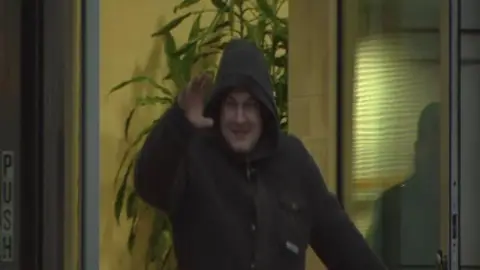My baby's killer should never be allowed out of prison
 BBC
BBCThe mother of a 14-week-old baby murdered by his father says he should never be released on parole.
Sheree Black's son Cameron died due to swelling of the brain caused by a severe blow to the head, inflicted by Ryan Leslie at his Newtownabbey home in 2008.
In 2011, Leslie was given a minimum 17-year life sentence. He is due to be considered for parole in two years but in advance of that Ms Black has been asked to submit a victim impact statement as part of a pre-tariff review.
A Department of Justice spokesperson said the Prison Service did not comment on individual prisoners.
 Sheree Black
Sheree Black"On the wider issue of rehabilitation and resettlement back into the community, when a life prisoner is approaching the last three years of the minimum sentence given by the courts, a process will begin to consider their suitability for pre-release testing," they said.
"Victims are an integral part of that and an impact statement will be requested to ensure their concerns are fully considered."
At the time of the sentencing, the judge said there was a significant risk that Leslie would commit further specified offences, and that there was a significant risk of serious harm to members of the public.
He said Leslie had "brutalised and murdered" his son.
'He tried to get away with it'
Ms Black was 18 when Cameron was killed.
Speaking to BBC News NI, she said she believed Ryan Leslie had not shown any remorse or admitted to murdering Cameron.
"I just think that if you were any kind of human being or man or father, you would show some sort of remorse, or admit what you had done, but this man has not, and I just feel that he will always remain the same," she said.
"He tried to get away with it and I was so young at the time that I didn't really comprehend what had happened."

Ms Black said she was contacted by the Parole Commissioners for Northern Ireland to say the process for Leslie's parole had begun and was requested to submit a victim impact statement.
She said it "brought a whirlwind of emotions back" to her, but said that it was "very important" that victims were a part of the process.
"I think it's a bittersweet situation. I never thought about that back then, when it happened. I didn't really know how I was going to do it, but I do think that it's good for victims to do that," she said.
"I think that's part of your healing journey. So I think it's very, very important."
She added that if Leslie admitted what he had done, she and her family "would have a little bit of closure".
Ms Black said she understood the judicial system was there to rehabilitate offenders but she believed Leslie had not shown signs he was rehabilitated.
"He killed my son. Life should mean life, however I understand the judicial system, and there has to be a tariff set in place," she said.
"However, I do believe that if you haven't shown any remorse, if you haven't rehabilitated, why should you be allowed back into the community? It doesn't make sense in my eyes."
'It still hurts'
Ms Black moved to Spain after Leslie was sentenced and said she had a "stigma" attached to her when she lived in Northern Ireland.
"When I lived here, I was known as the girl whose baby was murdered," she said.
"This whole situation with the impact statement, I think it was something that I needed to do that I didn't even realise. I think this is part of my healing journey.
"I think this is me coming back as a 35-year-old woman and saying: 'Hey, yeah I am the girl whose baby was murdered, but I'm a woman now, and it still hurts like it hurt 16 years ago, and I don't think that this man should be allowed out for what he's done'."
Ms Black has since connected on social media with other women whose children have been murdered by their father or another family member.
She said there should be a way for them to remember their children in a positive light.
"I know it sounds awful, but this is the reality and, meeting the women that I have, I would like to create a safe space or a platform or a community in something for us women to come together and to remember our children in a positive light.
"It's such a negative situation in my life, it doesn't get any easier ever to tell the story, but I would like to try and do something positive in memory of Cameron."
How does the parole process work?
The parole process begins when Northern Ireland Prison Service refers a prisoner's case to the Parole Commissioners for Northern Ireland.
The commissioners will review the case and decide if the prisoner is suitable for release.
If they decide that the prisoner should be released then the prisoner will be subject to license conditions.
But if they decide against releasing the prisoner, they will offer recommendations including when the case should be reviewed again.
The commissioners' decision can only be challenged through a judicial review.
What is a pre-tariff review?
In Leslie's case, before the parole process begins, a pre-tariff review is being carried out.
Ms Black has been asked to submit a victim impact statement as part of this process.
A pre-tariff review typically takes place three years before the end of the minimum term an offender must spend in prison before being considered for release.
